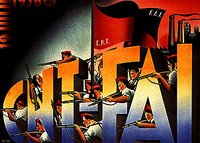 An Spailpín Fánach has been catching up with his Orwell, reading Homage to Catalonia over the weekend. The book is Orwell’s famous account of the Spanish Civil War, which started seventy years and one month ago. The Spanish Civil War has long been considered one of the defining moments of the 20th Century, but it’s relevance is now quickly disappearing into history now – the most surprising thing about reading Homage to Catalonia now is just how much it’s dated.
An Spailpín Fánach has been catching up with his Orwell, reading Homage to Catalonia over the weekend. The book is Orwell’s famous account of the Spanish Civil War, which started seventy years and one month ago. The Spanish Civil War has long been considered one of the defining moments of the 20th Century, but it’s relevance is now quickly disappearing into history now – the most surprising thing about reading Homage to Catalonia now is just how much it’s dated.
Orwell, like many others, went to Spain to fight for the working man. But who is the working man today? The lumpen mass of proletariat that had nothing to lose but their chains now no longer exist as a demographic, having been wiped out by progress in technology and automation – history has passed them by, and they are no more relevant to society today than high-born aristocrats, their exact opposite numbers when a bitter Karl Marx was writing Das Capital in the middle of the nineteenth century. We now have a new social model where terms like bourgeoisie and proletariat no longer apply, and nobody has come up with suitably descriptive replacements. We don’t know our own society any more, and the Politically Correct Police are strident in their opposition to anyone being labelled as anything at any time. That could be because the PC Peelers rather liked the Marxist classifications of course. Who knows?
Orwell remains a delight to read, however. Orwell’s prose is always Spartan, direct and to the point, and his description of the wretched (a pet Orwell term, “wretched,” as are “vile” and “beastly”) life of the militiaman in the Spanish Civil War is suitably evocative. You don’t need to read much beyond Orwell’s remark that war smells of excrement and rotting food to know that the Spanish Civil War wasn’t much crack. The political digressions are remarkable – even as he wrote them, Orwell advised his readers to skip them if they found politics heavy going. Seventy years on, their subtle distinctions between the different factions of the Left in 1930s Spain make the medieval scholastic disputes seem straight-forward. It’s mind-boggling that a man as clever as Orwell could ever have signed up for this hopelessly misguided school of politics that believed that human nature could be changed so radically.
It’s not all bleak, however. Orwell can be quite droll in a very deadpan sort of way, and the continuing craving for cigarettes, and lots of them, even while rats are crawling over him in the night or the lead is flying about his ears, always raises a smile. I can only hope in whatever other-worldly Workers’ Paradise Orwell’s shade now resides, he doesn’t have to go outside for a smoke. That would be beastly in the extreme.
Technorati Tags: books, politics, George Orwell
skip to main |
skip to sidebar
Twitter
Label Cloud
Blog Archive
-
▼
2006
(116)
-
▼
August
(11)
- Reflections on the Revolution in Croker
- Let Them Eat Cake - Dublin Media Disgrace Themselves
- Junkietown
- Homage to Catalonia
- "Gas" on Mars
- How Do You Solve a Problem Like McDonald?
- Grá Átha Cliath
- Reading Johnno: Deconstructing the Sultan of Spin
- Cad a Dhéanamid Feasta Gan Muire?
- Mayo v Laois - a Hop Ball Game
- Superman Returns
-
▼
August
(11)


